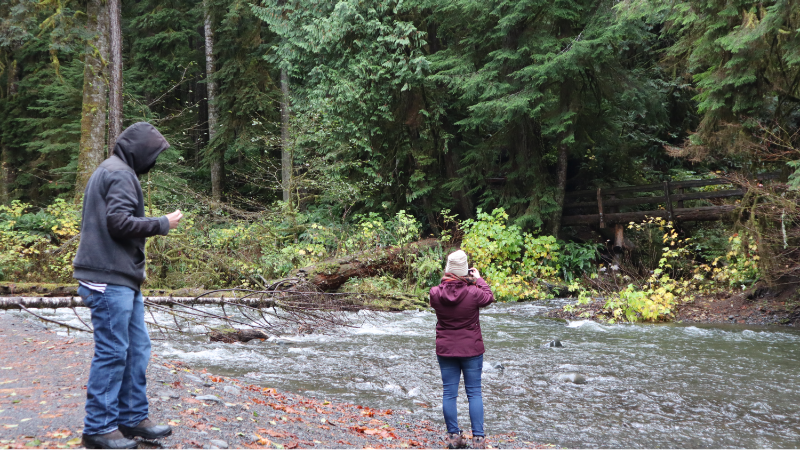
Consequences and letting go is about recognizing the choices we make that lead to consequences we don’t want to experience. Such choices have a tendency to be self-sustaining. That is because we usually make choices in the belief that those choices will make the problem better. But if we continue to make choices that we know aren’t going to make the problem better, then we’re going to continue to get the same results over and over again. The attempted solution to the problem instead makes the problem worse.
One way to get different consequences is to practice letting go. Letting go leads to radical acceptance. That is, if you are faced with a consequence you cannot change, then the only alternative is to accept that this situation cannot be changed. The first step to letting go is to ask ourselves, “What is the worst thing that can happen in this situation?”
This doesn’t mean that we’re asking for the purpose of minimizing or denying concerns. It means that we’re asking this question so we can really figure out what we’re having difficulty accepting. Our fears are usually worse than the reality in situations like this. In some cases, our fears of the worst thing happening might actually be worse than if the worst thing actually did happen.
Once you’ve figured out what the worst thing is, next ask yourself, “Am I prepared for the worst thing? If not, can I accept the worst thing?” If you find that the answer is that you are not prepared for the worst thing, then the next step is to prepare yourself for the worst thing. In many cases where emotional aggression is an issue, the ‘worst thing’ involves other people. If the ‘worst thing’ is that someone else might gain the upper hand, or that someone else might be right, or even that someone else might even leave you, honestly ask yourself, “If this person is going to leave me, and I’m so stressed out about that possibility that I’m acting out in emotionally aggressive ways, would their leaving really be a bad thing?”
Another thing to ask n this situation is, “Am I so worried about this person leaving me that my behavior is actually going to be the reason that this person leaves me?”
Next ask yourself, “Can I live the rest of my life this way if nothing changes? Who has the power to change it?” Note that in this case, ‘changing it’ doesn’t mean trying to get the other person to change. Changing it in this case means either changing yourself or ending the relationship. If you attempt to change the other person, you’re back to engaging in emotional aggression.
If you are having difficulty in accepting a consequence, answer the questions below about the consequence you’d like to change. Remember that the only way to change the consequence is indirectly, by changing the belief and the choice that led to the consequence. If the consequence has already happened, the only alternative left is to accept it and to make different choices the next time so you don’t get a similar consequence.
Questions to Ask Yourself about Consequences and Letting Go
Think about a consequence that you’d like to re-evaluate. It may help to write it down.
Now answer the question, “What is the worst thing that can happen in this situation?” Focus on what you’re afraid might happen if you attempted to change the consequence by making a difference choice the next time. What we’re focusing on here is the consequence after the consequence. If you react negatively to a consequence, then you’ve just created another consequence that is also likely to turn out negative.
Next, answer the question, “Am I prepared for the worst thing?” This question is designed to ask if you have used all of your mindful skills to help you cope should the worst thing happen. Think of which coping skills from previous sessions might help you to find a way to prepare for the thing that you are afraid might happen. If the worst thing has already happened, ask yourself which coping skills might be used to help you to accept what has happened so that you can move on without acting in such a way that you get even further negative consequences.
The next question, “If not, can I accept the worst thing?” involves ways to let go of the consequence without feeling the need to act in an emotionally aggressive way, thereby getting yet another negative consequence. Think about the consequence you are evaluating and see if accepting the ‘worst thing’ in this scenario might help you to find a way to let go. If the consequence has already happened, remember that you can’t change what’s already happened, so there’s really nothing to let go of. All you can do is to engage in ‘damage control’ so that you don’t make the situation worse.
The question, “Can I live the rest of my life this way if nothing changes?” helps to re-set your perception filter by focusing on the assumptions that led to the consequence. Let’s break that down a bit.
Consequences are the result of choices. If you’ve just experienced a negative consequence, ask yourself what choices you made that led to the negative consequence. Then ask yourself what might have to change in order to avoid getting a similar consequence the next time. Remember to keep the focus on what you have the power to change, and avoid ‘musterbating’ by avoiding the temptation to say what others should have done or could have done.
This leads to the final question, “Who has the power to change it?” If the answer to this question involves anyone else but yourself, then the only choice you have is to accept that the consequence is beyond your control. In that case, you will have to accept that this is just the way things are (mindful awareness) or change the way you think about it so that you may focus on the aspects of it that you do have the power to change.
Those aspects that you have the power to change are those choices that you made that led to the consequence. If the consequence was the result of something someone else did and you truly couldn’t have made any choice yourself that would have led to a different consequence, then the only remaining choice is to end the relationship. This is especially true if the consequence you experienced involved being abused in some way. In such a situation, no choice that you made led to the consequence of being abused. There is never any justifiable reason for abuse, and it is never the victim’s fault. In a situation where the consequence was abuse, the choice is to seek help immediately or to find safety as quickly as possible, and to set firm boundaries so that it never happens again.
Consequences and Letting Go List
For the sake of brevity, here’s a bullet list of questions to ask yourself when evaluating consequences. Evaluating consequences in this manner facilitates letting go.
What is the worst thing that can happen in this situation?
Am I prepared for the worst thing?
If not, can I accept the worst thing?
Can I live the rest of my life this way if nothing changes?
Who has the power to change it?
The final lesson of Consequences and Letting Go is that you cannot change others. You can only change yourself. Remember that and letting go becomes easier. You can also download the worksheet below for practice in letting go.

